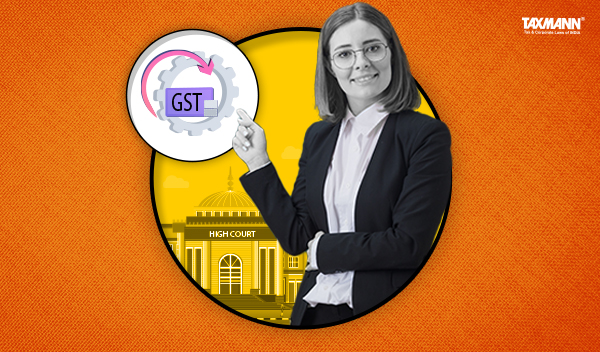Delhi HC Upheld Validity of Notification Levying GST on Recovery Agent Services Under RCM
- News|Blog|GST & Customs|
- 2 Min Read
- By Taxmann
- |
- Last Updated on 24 April, 2024

Case Details: Pace Setters Business Solutions (P.) Ltd. v. Union of India - [2024] 161 taxmann.com 589 (Delhi)
Judiciary and Counsel Details
-
- Vibhu Bakhru & Amit Mahajan, JJ.
- Bharat Raichandani, Deepak Khokhar, & Chiatanya G. Tripathi, Advs. for the Petitioner.
- Vivek Goyal, CGSC for UOI, Gokul Sharma, Adv., Akshay Amritanshu, Sr. Standing Counsel, Ashutosh Jain, & Ms Anjali Kumari, Adv. for the Respondent.
Facts of the Case
The petitioner was engaged in the business of providing services as a recovery agent to a Non-Banking Financial Company (NBFC). It entered into contracts with various service providers (sub-contractors) for availing their services for discharging its obligations under the Agreement with NBFC. The petitioner contended that it was unable to utilize credit for taxes paid in respect of services availed from its sub-contractors. It filed writ petition to challenge the levy of reverse charge on recovery agent services since it was aggrieved on account of service tax and GST in respect of the said services being payable on a reverse charge basis.
High Court Held
The Honorable High Court noted that the petitioner would not be entitled to claim any credit for the service tax or GST paid on inputs as it would not be liable to pay any service tax or GST on the services of a recovery agent, rendered by it. The Central Government has in its wisdom selected certain services on which service tax/GST is payable on a reverse charge basis. The matter relating to whether any such credit is available and to which extent it is available, is a matter of statutory prescription. The right to avail input tax credit is a statutory right and is available only if the statute provides for the same and that too to the extent that the statute permits.
The Court further noted that Article 14 of the Constitution of India does not prohibit reasonable classification, which has rational nexus to its object. Therefore, the challenge of levy of GST on reverse charge basis was not tenable and liable to be rejected.
List of Cases Reviewed
-
- Income Tax Officer & Ors. v. R. Takin Roy Rymbai & Ors. (1976) 103 ITR 82
- Khadinge Sham Bhat v. Agricultural Income Tax Officer & Anr. AIR 1963 SC 591
- Twyford Tea Co. Ltd. v. State of Kerala & Anr. (1970) 1 SCC 189. relied on.
List of Cases Referred to
-
- India & Ors. v. N.S. Rathnam and Sons: 10 SCC 681 (para 20)
- India v. Adani Power Limited 331 ELT 129 (SC) (para 21)
- India v. Cosmo Films Ltd. 9 SCC 244 (para 23)
- ALD Automotive Pvt. Ltd. v. Commercial Tax Officer: 13 SCC 225 (para 25)
- India v. VKC Footsteps India Pvt. Ltd.: 2 SCC 603 (para 25)
- ITO v. N. Takin Roy Rymbai [1976] 103 ITR 82 (SC) (para 34)
- Khadinge Sham Bhat v. Agricultural ITO AIR 1963 SC 591 (para 35).
Disclaimer: The content/information published on the website is only for general information of the user and shall not be construed as legal advice. While the Taxmann has exercised reasonable efforts to ensure the veracity of information/content published, Taxmann shall be under no liability in any manner whatsoever for incorrect information, if any.

Taxmann Publications has a dedicated in-house Research & Editorial Team. This team consists of a team of Chartered Accountants, Company Secretaries, and Lawyers. This team works under the guidance and supervision of editor-in-chief Mr Rakesh Bhargava.
The Research and Editorial Team is responsible for developing reliable and accurate content for the readers. The team follows the six-sigma approach to achieve the benchmark of zero error in its publications and research platforms. The team ensures that the following publication guidelines are thoroughly followed while developing the content:
- The statutory material is obtained only from the authorized and reliable sources
- All the latest developments in the judicial and legislative fields are covered
- Prepare the analytical write-ups on current, controversial, and important issues to help the readers to understand the concept and its implications
- Every content published by Taxmann is complete, accurate and lucid
- All evidence-based statements are supported with proper reference to Section, Circular No., Notification No. or citations
- The golden rules of grammar, style and consistency are thoroughly followed
- Font and size that’s easy to read and remain consistent across all imprint and digital publications are applied



 CA | CS | CMA
CA | CS | CMA
